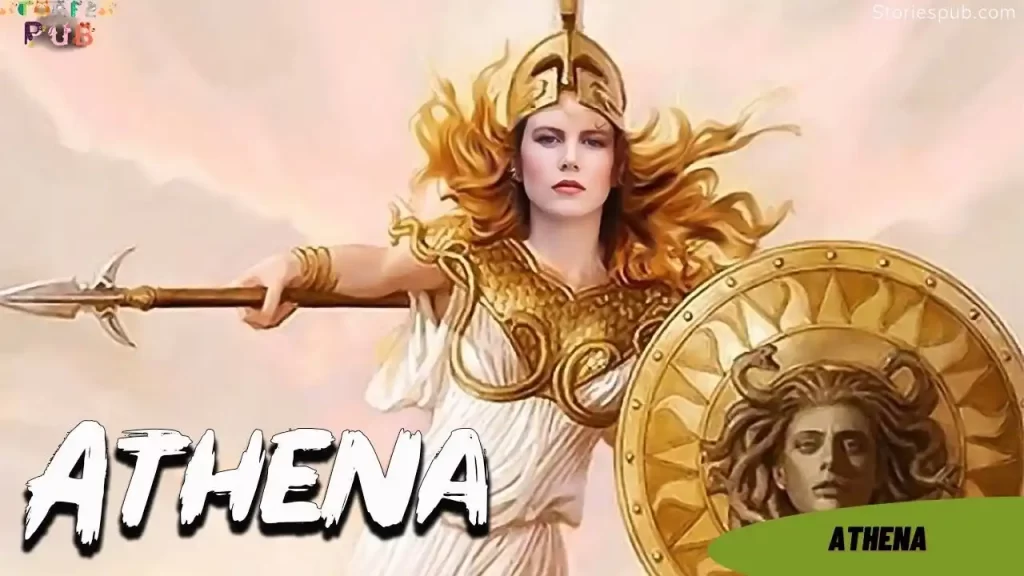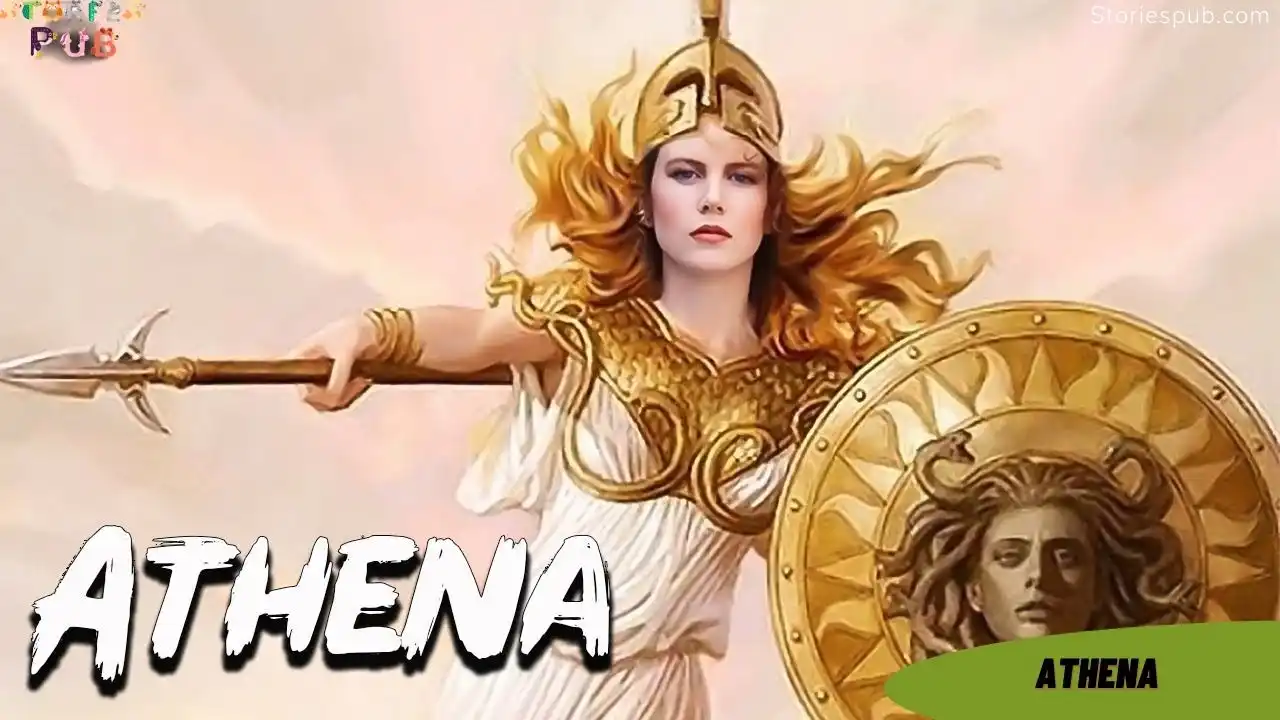Athena, the Greek Goddess of Strength and Intelligence

Athena is one of the most prominent figures in Greek mythology, known for her wisdom, courage, and strategic prowess. As the goddess of civilization, law, and justice, she was highly revered by the ancient Greeks and was one of the twelve Olympian gods and goddesses. Her story is shrouded in mystery and myth, but her legacy has endured for thousands of years. In this article, we’ll look at Athena’s story and the different parts of her life and legend.
Athena’s Story:
Athena was born from the head of Zeus, the king of the gods. According to one myth, Zeus swallowed his first wife, Metis, who was pregnant with Athena. Zeus had been warned that any child born of Metis would be more powerful than him, so he consumed her to prevent this from happening. However, Zeus began to suffer from terrible headaches, and eventually, Hephaestus, the god of fire, split his head open with an axe. From the wound emerged Athena, fully grown and wearing armor.
You would also like to Read Tales of Ancient Greek Heroes
Athena’s birth made her the only Olympian god or goddess to have been born without a mother, which emphasised her status as a virgin goddess. She was often depicted with an owl, which was a symbol of wisdom and knowledge. Athena was highly intelligent and was said to have a great sense of justice, which made her a popular figure among the ancient Greeks. Her strategic mind and military prowess also made her a powerful ally in times of war, as she was known to help the Greeks defeat their enemies in battle.
Despite her strength and intelligence, Athena had a vulnerable side. She was prone to anger and was often quick to take offense. In one myth, she punished Arachne, a mortal who had boasted of her weaving skills and dared to challenge Athena to a weaving contest. When Arachne won, Athena turned her into a spider as punishment.
You would also like to Read Medusa Story
Athena’s connection to Zeus, her intelligence, and her role in battle made her a beloved and respected figure in Greek mythology.
Athena’s Powers:
Athena was known for her many powers and abilities, which made her a formidable force in Greek mythology. As the goddess of wisdom, she was renowned for her intelligence and strategic thinking. She was also the goddess of courage, which made her a powerful ally in times of war. In addition to these attributes, Athena was the patron goddess of several other things, including:
- Law and justice
- The arts and crafts
- Agriculture and fertility
- Navigation and trade
- Philosophy and reason
Athena’s diverse range of powers and abilities made her a highly respected and revered figure in Greek mythology. Her intelligence and wisdom made her an advisor to many of the other gods and goddesses, and her strategic mind and military prowess made her a valuable ally in times of war. She was usually shown with armor, a shield, and a spear, which showed that she was a fierce warrior.
Athena’s Weaknesses:
Despite her many powers and abilities, Athena was not invincible. Like all of the gods and goddesses in Greek mythology, she had weaknesses and vulnerabilities. One of her biggest weaknesses was her tendency to be easily offended and quick to anger. This led to several conflicts and disagreements with other gods and mortals, which sometimes resulted in disastrous consequences.
You would also like to Read List of Greek God
In addition to her temper, Athena was also vulnerable to certain types of magic and trickery. In one myth, the god Hermes stole some of Athena’s cattle, and when she discovered the theft, she challenged him to a musical contest. Hermes won the contest by making the lyre, which made Athena feel embarrassed and like she had lost.
Despite these weaknesses, Athena’s many powers and abilities made her a highly respected and revered figure in Greek mythology. Because she was smart, brave, and good at making plans, she was a valuable ally in battle, and the ancient Greeks liked her because she was the goddess of many things.
Athena’s Family Background:
Athena was the daughter of Zeus and the Titaness Metis. According to the myths, Zeus feared that Metis would give birth to a son who would be more powerful than him, so he swallowed her whole. When Metis was born, she was already pregnant with Athena, and she grew inside Zeus until she was fully grown and armoured from his forehead.
As the daughter of Zeus, Athena was one of the most powerful goddesses in Greek mythology. She had several siblings, including Apollo, Artemis, Hermes, and Ares. Athena was particularly close to her brother Apollo, who shared her love of music and the arts.
Athena’s Husband and Children:
Despite being one of the most powerful and revered goddesses in Greek mythology, Athena did not have a husband or any children. She was known as a virgin goddess, which meant that she had sworn off romantic relationships and focused instead on her duties as a goddess.
However, there are several myths surrounding Athena’s romantic relationships. In one myth, the god Hephaestus tried to woo Athena by making her a beautiful golden throne. When she sat on the throne, it suddenly closed on her, trapping her. Hephaestus offered to release her if she agreed to be his wife, but Athena refused, and he eventually released her without any further demands.
You would also like to Read Zagreus Story
In another myth, the god Poseidon fell in love with Athena and pursued her relentlessly. However, Athena rejected his advances, and Poseidon became angry and sought revenge by flooding the city of Athens. Athena was able to calm Poseidon down and persuade him not to destroy the city. However, the incident showed how angry the two powerful gods were with each other.
Even though these myths say otherwise, Athena stayed a virgin goddess and focused all of her energy on the many things she had to do as one of the most powerful and respected figures in Greek mythology.
Athena’s Facts:
Here are some interesting facts about Athena that many people may not know:
- Athena was often called Pallas Athena or simply Pallas, which was derived from her childhood friend Pallas, whom she accidentally killed in a sparring match.
- Athena was the patron goddess of the city of Athens, which was named after her.
- She was often shown with a shield, a spear, and a helmet, which showed how good she was at war and how good a strategist she was.
- Athena was a virgin goddess, and her sacred animals were the owl and the snake.
- In addition to being the goddess of wisdom and warfare, Athena was also associated with crafts and weaving. She was thought to have invented the loom and was the goddess of weavers and other craftspeople.
Athena’s Symbols:
Athena was associated with several symbols that represented her various powers and qualities. Some of the most common symbols associated with Athena include:
- The owl: The owl was Athena’s sacred animal and was often depicted alongside her. The owl was a symbol of wisdom and intelligence and was associated with Athena’s role as the goddess of knowledge and strategy.
- The olive tree: Athena was said to have created the first olive tree, and it became one of her symbols. The olive tree was a symbol of peace and prosperity and represented Athena’s role as protector of Athens.
- The Aegis: The Aegis was a shield or breastplate that Athena often wore. It was said to be made of goat skin and was adorned with the head of Medusa. The Aegis was a symbol of Athena’s power and protection and was often used to intimidate her enemies.
Overall, Athena’s symbols showed her many different roles and qualities as a goddess, from her wisdom and knowledge to her military skill and protection of her people.
Athena’s Characteristics:
Athena was known for her many personality traits and character strengths. Here are a few of the most notable:
- Intelligence: Athena was the goddess of wisdom and was known for her great intelligence and strategic thinking.
- Bravery: Athena was a fierce warrior goddess and was known for her bravery in battle.
- Justice: Athena was a just and fair goddess who was always willing to stand up for what was right.
- Patience: Athena was a patient goddess who could wait for the right moment to strike.
Overall, Athena’s characteristics made her a beloved goddess who was admired for her many strengths and qualities.
The Athena and Medusa Story:
One of the most famous stories associated with Athena is the tale of Medusa. Medusa was once a beautiful woman who caught the eye of the sea god Poseidon. Athena was angered by Poseidon’s advances and punished Medusa by turning her into a monster with snakes for hair. Anyone who looked at Medusa was turned to stone.
You would also like to Read Nyx Goddess
In this story, Athena was a powerful and vengeful goddess who was not afraid to take action against those who wronged her or her followers. She used her powers to punish Medusa for her association with Poseidon and to protect her people from harm.
The story of Athena and Medusa is just one example of the many myths and legends associated with Athena and her powers. In Greek mythology, Athena was a strong, upright goddess whom both gods and humans feared and revered.
Athena’s Life: Famous Incidents and Wars:
Athena was often involved in famous incidents and wars in Greek mythology. Here are a few notable examples:
- The Trojan War: Athena was one of the key players in the Trojan War and was known for her support of the Greek army. She was an important part of making battle plans and a strong force on the battlefield.
- The War of the Giants: Athena was also involved in the War of the Giants, a mythological battle between the gods and the giant sons of Gaia. She helped Zeus and the other gods fight the giants and put the universe back in order.
- The Quest for the Golden Fleece: In this famous myth, Athena aided Jason and the Argonauts in their quest for the Golden Fleece. She helped them get through dangerous waters and gave them advice and direction as they traveled.
Overall, Athena was a powerful and influential goddess who played a key role in many of the most famous incidents and wars in Greek mythology.
Athena is typically portrayed as follows:
Throughout history, Athena has been portrayed in a variety of different ways in art and literature. Some common themes and characteristics associated with her include:
- Wisdom: Athena is often shown as a wise and smart goddess who stands for learning and knowledge.
- As a fierce warrior, Athena is also often shown with a helmet and spear in her hands.
- Just: Athena is a symbol of justice and fairness and is often shown holding scales or other symbols of justice.
- Athena is frequently referred to as a “virgin” goddess, meaning she did not have any romantic relationships or children.
In art and literature, Athena is typically depicted in a variety of different poses and situations. Some of the most famous pieces of art that show Athena are the frieze on the Parthenon, the statue of Athena in the Louvre, and a lot of other old and new pieces.
You would also like to Read Hermes God Story
Overall, Athena’s many symbols and characteristics have made her a beloved figure in Greek mythology, and her legacy continues to live on today.
Athena’s animal symbol
Athena was often associated with different symbols, and one of the most famous was the owl. The owl was a symbol of wisdom, knowledge, and insight, all of which were traits that Athena embodied. In Greek mythology, the owl was Athena’s sacred animal, and it was often shown with her in art.
You would also like to Read Pan God
The owl’s connection to Athena may have stemmed from its reputation as a bird of prey that could see in the dark. This ability to see things that others could not see was similar to Athena’s ability to see beyond the surface level of things and understand the deeper truths.
Athena’s role in the Iliad
Athena played a crucial role in Homer’s epic poem, the Iliad. As a goddess of war and wisdom, Athena supported the Greeks in their fight against the Trojans during the Trojan War. In the poem, Athena is described as a fierce warrior and strategist who advised and assisted the Greek hero, Odysseus.
One of Athena’s most famous interventions in the Iliad was when she convinced Pandarus, a Trojan archer, to shoot an arrow at Menelaus, a Greek warrior, breaking the peace between the two sides. This act of treachery ultimately led to the war, and it was because of Athena’s intervention that the Greeks were able to claim victory in the end.
You would also like to Read Hypnos Greek God
Athena’s role in the Iliad demonstrated her strength, intelligence, and strategic thinking, all of which were essential qualities for a successful warrior. Her support for the Greeks also showed how fair she was and how loyal she was to people she thought were good.
Common Questions About Athena
Athena is a complex figure in Greek mythology, and there are many questions that people may have about her. Some of the most common questions include:
- Why was Athena called a virgin goddess? Athena was called a virgin goddess because she never married or had children. She was also known for her chastity and purity.
- Why did Athena fear Poseidon? Athena and Poseidon were both contenders for the city of Athens, and they had a rivalry that went back centuries. Athena feared Poseidon because of his power over the sea, which she could not control.
- Who were Athena’s enemies? Athena had several enemies in Greek mythology, including the god Ares, who represented war and bloodshed, and the Titan Prometheus, who gave fire to humans.
- Athena’s childhood friend Pallas
Athena had a close childhood friend named Pallas, who was also a goddess. According to the myth, Athena and Pallas were practising their fighting skills together when Athena accidentally killed Pallas. Overcome with grief, Athena created a statue in honour of her friend, which she carried with her into battle. The statue was known as the Palladium, and it was believed to protect the city of Troy from harm. The story of Pallas and the Palladium is just one example of the deep emotional connections that the Greek gods and goddesses had with each other and the lasting impact that these relationships had on their mythology.
Athena’s brothers and sisters
In Greek mythology, Athena was the daughter of Zeus, the king of the gods, and Metis, a Titan goddess of wisdom. She had several brothers and sisters, including Apollo, Artemis, Ares, Hermes, Dionysus, and Persephone.
You would also like to Read Aphrodite
Apollo and Artemis were twin siblings of Athena, and they all shared a common father, Zeus. Apollo was the god of music, poetry, and prophecy, while Artemis was the goddess of hunting, childbirth, and virginity. Athena was often linked to both of them because they had similar qualities, like being brave, smart, and good.
Ares, on the other hand, was the god of war and represented the violent and destructive aspects of conflict, which was in stark contrast to Athena’s strategic and tactical approach to warfare. Hermes was the messenger of the gods, and Dionysus was the god of wine, fertility, and theater. Persephone, who was also Athena’s half-sister, was the goddess of the underworld and the wife of Hades.
Sacred Plants of Athena
The sacred plants associated with Athena were the olive tree, the laurel tree, and the aloe plant. The olive tree was the most significant plant associated with Athena and was considered sacred to her. According to legend, Athena created the olive tree as a gift to the people of Athens in a competition with Poseidon over who would become the city’s patron deity. The laurel tree was also sacred to Athena and represented victory and triumph. The aloe plant was believed to have healing properties, and Athena was often depicted holding a branch of aloe in her hand.
Conclusion
Athena was one of the most significant and widely worshipped goddesses in Greek mythology. She was associated with wisdom, courage, and many other virtues and was revered by both gods and mortals. Her story, powers, weaknesses, and relationships with other gods and goddesses have been a subject of fascination for centuries. The legacy of Athena continues to inspire and captivate people today, and her influence can be seen in art, literature, and culture.
Thanks For Reading… Athena, the Greek Goddess of Strength and Intelligence
Hey kids, how much did you like Athena, the Greek Goddess of Strength and Intelligence? Please share your view in the comment box. Also, please share this story with your friends on social media so they can also enjoy it, and for more such stories, please bookmark storiespub.com.
Check out other stories that we have:





